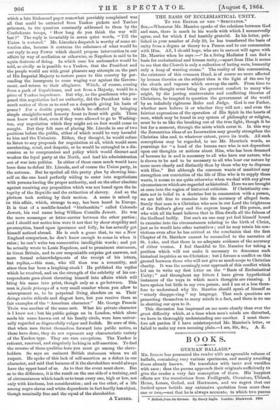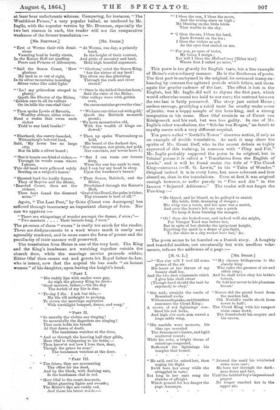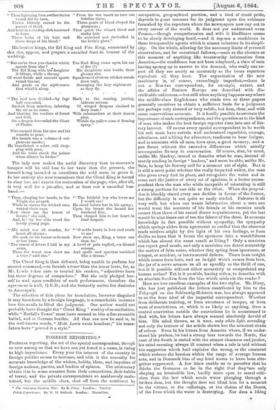BOOKS.
GERMAN BALLADS.*
• Ballads from this Getman. By Henry Inglis. London: Blackwood. 1864 Mn. INGLis has presented the reader with an agreeable volume of ballads, containing very various specimens, and mostly avoiding those already known. He translates with taste and versifies with ease ; thus the poems approach their originals sufficiently to give the reader a very fair conception of them. His 'happiest efforts are the translations from Freiligrath, Ch amiss°, Uhland, Heine, Lenau, Geibel, and Hartmann, and we regret that our limited space forbids any extensive quotation from more than one or two,—not that he is always accurate, to which two poems
at least bear unfortunate witness. Comparing, for instance, "The Wealthiest Prince," a very popular ballad, as rendered by Mr. Inglis, with the superior version by Mr. Drennan, especially the two last stanzas in each, the reader will see the comparative weakness of the former translation :-
[Mn. DRENNAN.]
"First at Worms their rich domi- nions Vaunting loud in lordly strain, In the Kaiser Hall sat quaffing Peers and Princes of .Allemayne.
"Said the Saxon Count, 'How • glorious My land in or out of sight, In its silver mountains hoarding Silver veins like solid light.'
"Lo! my princedom steeped in plenty,' Quoth the Elector of the Rhine, 'Golden ears in all its valleys On its hills the sun-clad vine.'
"Then spoke Lewis of Bavaria, Wealthy abbeys, cities wide— Need a realm that owns such riches Yield to any land beside?'
"Eberhard, the snowy-bearded, Wirtemberg's beloved lord, Said, 'My home has no largo city, Nor its hills a silver hoard ; "'But it boasts one kind of riches,— Through its woods roam where I please, This old head were pillowed safely Resting on a subject's knees.'
"Shouted loud the lordly Saxon, They of Bayern and the Rhine, 'Bearded Count, thou art the richest, Thou boat found the diamond mine." "Then up spake Wurtemberg so bold,
His beard of the darkest dye, Nor vintages' nor grain, nor gold, Nor convents, nor towns have I;
"'But I can roam our forests deep, When the sun has sunk to rest, And I can lay my head in sleep Upon the wanderer's breast.'
"Then Saxon, Bairisch, and the Rhine, Proclaimed through the Kaiser's Hall, Graf of the Beard, the palm is thins; Thy treasure is best of all.'" [MR. INGLIS.] " At Worms, one day, a princely band, In the height of their content, And pride of ancestry and land, Held high boastful argument.
"'Glorious,' cried the Saxon King, Are the riches of my land ! The silver ore lies glistering Through the rock and river strand.'
"'Ours is the fabled Grecian horn,' Said the ruler of the Rhine, Our valleys wave with golden corn,
On our mountains grows the Tine.'
"'We have our cities red with gold,' Qaoth the Bairiseh monarch proud ;
We have monasteries old, With the wealth of kings en- dowed.'
Again, "The Last Poet," by Griin (Count von Auersperg) has suffered through inaccuracy an important change of form. Nor can we approve :— "There are whisperings of wonder amongst the dames, 1 ween "Two muskets . . . Their barrels long, 1 ween."
The presence of these " weens" is really too much for the reader. These are disfigurements to a work where much is easily and agreeably rendered, and in some cases the form of poems and the peculiarity of their manner well preserved.
The translation from HeMe is one of the very best. The King and the King's headsman are watching together outside the church door, while the marriage service proceeds within; Ritter Olaf then comes out and greets his Royal father-in-law, who is intent, now that the nuptial tie has made " an honest woman" of his daughter, upon having the knight's head.
"Pear I.
"His ruddy lips with smiles were gay, As nigh the gloomy King he drew: Good morrow, father,—'tis the day The forfeit of my life is due.
"'To-day I die. I ask but this,—
My life till midnight to prolong, To crown the marriage mysteries With torchlight banquet, dance, and song.'
• "PART II.
"So merrily the violins are ringing!
So mournfully the flageolets are singing I That each holds his breath At that dance of death.
The headsman watches at the doer,
"And as through the heaving hall they glide, Herr Olaf is whispering to his bride,— 'Thou know'st not how I love thee, dear, Though the grave be near.'
The headsman watches at the doer.
"PART III.
"The friars they are murmuring The °dee for the dead, And by the block, with flashing axe, Is the headsman clad in red.
"Herr Olaf to the court descends, Midst glancing lights and swords ; The Ritter's lips are ruddy red, And these his latest words :— "'I bless the sun, I bless the moon, And the roving stars on high ; My blessing on the little birds That warble in the sky.
"I bless the sea, I bless the land, Each floweret on the lea ; I bless the violets as soft As the eyes that smiled on me.
"'For you, ye eyes of violet, My being I resign ;
Yet will I bless the Holland tree [Elder tree] Where first I called ye mine; "
This poem is too ghastly for English taste, but a fine example of Heine's extraordinary manner. He is the Beethoven of poets. The first part is unrhymed in the original, its measured tramp en- hancing by contrast the agitated periods which follow, and these again the gentler cadence of the last. The effect is lost in the English, but Mr. Inglis did well to rhyme the first part, which would otherwise sound too bald to our ears ; the contrast between the two last is fairly preserved. The story just suited Heine ; useless revenge, gratifying a rabid taste for cruelty under cover of justice, was a happy sample of the hero-king, and a strong temptation to his muse. Herr Olaf reminds us of Count von Konigsmark and his end, but was less guilty. In one of Mr.
Inglis's other translations, the " Schelm von Bergen," an insult to royalty meets with a very different requital.
The poem called " Norfall's Tower deserves notice, if only as an example of double translation. As such it may cheer the spirits of Mr. Grant Duff, who in the recent debate so highly approved of this training, in common with "Pliny and Pitt." Mr. Inglis probably supposed the poem to be original, but in Trinius' poems it is called a "Translation from the English of Lewis," and it will be found under the title of "The Cloud King—ORIGINAL :-11. G. Lewis," in his "Tales of Wonder." Original indeed it is in every form, but more coherent and loss absurd so, than in the translations.' Even at first it was original enough however, to suffer parody in "Fire and Ale" in the famous "Rejected Addresses." The reader will not forget the
Fire-king :—
" He blazed, and he blazed, as he gallop'd to snatch
His bride, little dreaming of danger ; His whip was a torch, and his spur was a match, And over the horse's left eye was a patch To keep it from burning the manger.
" Oh ! then she looked sour, and indeed well she might, For Vinegar Yard was before her, But in spite of her shrieks the ignipotent knight, Enrobing the maid in a flame of gas-light, To the skies in a sky rocket bore her," 6:c.
The poem seems to he founded on a Danish story. A haughty and beautiful maiden, not unnaturally but with needless vehe- mence, refuses the addresses of a page :— [M. G. L.)
—"4 Nor e'er will I wed till some prince of the air
His heart at the throne of my beauty shall lay, And the two first commands which I give him shall swear (Though hard should the task be enjoined) to obey.'
"She said; straight the castle of Rosenhall rocks With an earthquake, and thunders announce the Cloud King ; A crown of red lightnings con- fined his red leeks, And high o'er each arm waved a huge sable wing.
"His sandals were meteors, his blue eye revealed The firmament's lustre, and light scattered round ; While his robe, a bright tissue of raindrops congealed, Reflected the lightnings his temples that bound.
"He said, and he seized her, then urging his flight Swift bore her away while she struggled in vain ; Yet long in her ears rang the shrieks of affright Which poured for her danger the page Amorayn. [Mn. Nous.]
"' My chosen bridegroom is tho stately king
Who rules the gnomes of air and elfish ring ; And he shall twice obey his bride's behest, Or fold her never to his phantom breast.'
"Scarce did the proud boast from the maiden fall, Old Norton's castle shook from tower to hall ; The Cloud King with his tempest train came down, The thunderbolt his sceptre and his crown.
"Around the maid his whirlwind arms were cast ; He bore her through the dark- ness fierce and fast, Until the faithful boy's impassioned prayer
No longer reached her in the upper air.
"Than lightning then swifter thrice round did be turn, Thrice bitterly cursed he the parent of Good, And nest in a chafing-dish hastened to burn Three locks of his hair and three drops of his blood." "From his wet beard he tore out bristles three, Three gouts of blood obeyed the gramarye ; Then quick the wizard blood and snaky hair He scorched and shrivelled in the levin's glare."
His brother kings, the Er! King and Fire King, summoned by this rite, appear, and prepare a cannibal feast in honour of the wedding.
'Fire seemed from his eyes and his nostrils to pour, His breath was a volume of sul- phurous smoke ; He brandished a sabre still drop- ping with gore, And his voice shook the palace when silence he broke." " But see'st thou you chariot which speeds from afar ? The En l King with his daughter it biings, while a throng Of wood fiends and succubi sports round the car, And goads on the night-mares that whirl it along.
" The *roof now divided—by fogs hall concealed,
Sucked from marshes, infecting the air as he came, And blasting the verdure of forest and field, On a dragon descended the Giant of Flame. The Earl King came upon his car of fire (?) His daughters sate beside their gloomy sire, Squadrons of elves on cricket-steeds drew nigh, Scourging the lazy nightmare as they fly.
. . . . .
Hark to the roaring, jarring, hideous scream Of winged dragons chained in fiery team !
With salamanders at their demon play, Within the yellow zone of flaming spray."
The lady now makes the awful discovery that to-morrow's banquet will be still less to her taste than the present, she herself being intended to constitute the cold meat to grace it. In her anxiety she now remembers that the Cloud King is bound to obey her, and exacts the restoration of the page, who, after all, is very well for a pis-aller, and at least not a cannibal hus- band:—
" Then, clasping her hands, to the Virgin she prayed,
While in curses the wicked ones vented their rage.
"Now show me tho truest of lovers she said, And, lo ! by her side stood the lovely young page.
"'His mind was all wonder, her heart all alarms ; She sank on his breast as he sank at her knee.
"The truest of lovers I fold in my arms,
Than the truest, now show me a truer !' said she." " The faithful boy who loves me I would see.'
He stood before her in his agony ; Upon his breast she leaned her forehead fair, Then clasped him to her heart in fond despair.
"0 noble heart, in love and truth to me !
Now show me, King, a truer one than he.'
A howl of pain replied, —a dismal scream, And spells and spectres vanished like a dream."
The Cloud King is thus defeated, being unable to perform her second command,—to furnish a truer than the truest lover, for, as Mr. Lewis takes care to remind his readers, "adjectives have but three degrees of comparison." But she only pledged her- self to wed upon condition of such performance, therefore the agreement is null, Q.E.D., and site instantly unites her destinies to Amorayn's.
The selection of this piece for translation, however disguised it may have been by a foreign language, is a remarkable instance. how this avails to blind the judgment. Our author would not probably have thought the "Cloud King" worthy of resuscitation, -while " Norfall's Tower" must have seemed to him a fine romantic ballad, and so German besides. All that can now be said is, in, the well-known words, "Matt. Lewis wrote bombast;" his trans- lators have "proved it a style."
































 Previous page
Previous page